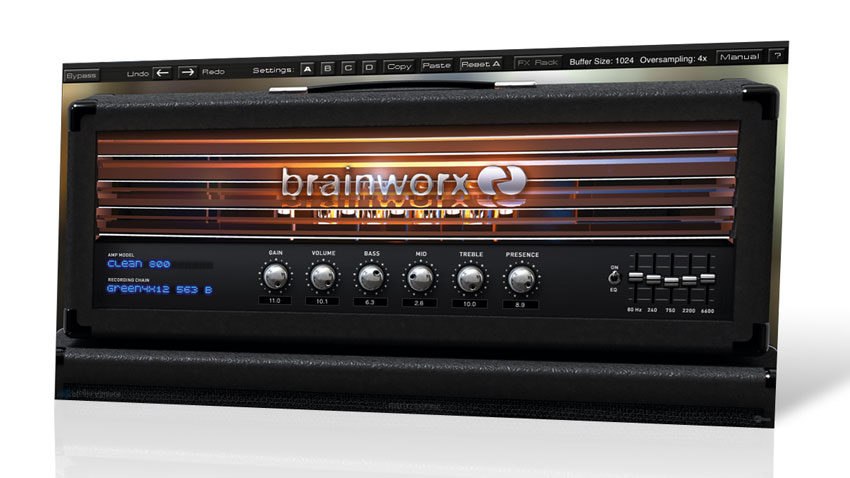MusicRadar Verdict
In terms of raw numbers, there's less here than most competitors, but what's there sounds absolutely fantastic.
Pros
- +
Sounds excellent. Five distinctive amp flavours. Engineer-tuned mic/cabinet settings. Huge time-saver. Useful sound-shaping filters.
Cons
- -
Limited cabinet/mic flexibility. No cabinet bypass. High oversampling will hit your CPU.
MusicRadar's got your back
Brainworx's bx_rockrack aims to apply a recording engineer's approach to guitar amp emulation, supplanting quantity with quality.
For this VST/ AU/RTAS plug-in for Mac and PC, the German effect overlords have modelled three amps (Marshall JCM800, ENGL 530 and Mesa Boogie Rectoverb) to produce five very specific-sounding amplifier channels (two clean, one crunch and two lead). These can be placed in a recording chain that includes one of four cabinets: Marshall 1960, Mesa Boogie 4x12, Orange 2x12 and Diezel 4x12.
The amp model and recording/cabinet chain sit in the middle of the plug-in's signal flow, bookended by what Brainworx call the FX Rack. This includes high- and low-pass filters and a noise gate before the amp input, while post-cabinet effects are made up of a graphic EQ, a delay and the company's own Shred EQ. This is a simple one-knob EQ that's stolen from the bx_shredspread plug-in, and is designed to reduce harshness and fatten up the sound - it works much like attenuating with high shelf EQ.
"Each chain on its own sounds excellent, ranging from the wonderfully clean Clean 530 to the blistering Modern Rock"
Rounding off the FX Rack is a tuner module. It's also worth noting that you can manually adjust oversampling (up to 8x) and buffer size, although high oversampling will hit your CPU harder, of course. The interface is sensibly arranged, with the prevailing amp controls and graphic EQ always available for tweaking at the bottom. Hitting the FX Rack button reveals the rest of the controls in the top half of the interface.
Nice 'rack
bx_rockrack's amp options are incredibly easy to use. The five amps all have the same essential controls (gain, EQ and presence), with slight variations to match the originals, such as Bright and Crunch options for the Clean ENGL 530. The cabinet/mic recording chains number 12 in total, and are labelled according to cabinet type and mic type, some with alternative versions offering slight variations on the sound.
Ignoring the FX Rack for one moment, each chain on its own sounds excellent, ranging from the wonderfully clean Clean 530, via the slightly tougher Clean 800, to the tight Crunch 800, the looser Lead 530 and the blistering Modern Rock. None of them sound fizzy or artificial, which is a major achievement in itself. Cabs range from the retro-sounding Marshall 4x12 with Neumann CMV563 mic, to the more hi-fi Mesa 4x12, more cutting Orange 2x12 and positively aggressive Diezel 4x12 with Royer 121 Ribbon mic.
The most useful elements of the FX Rack are the preamp filters and the Shred control. The high-pass filter is great for clearing out low frequencies, while the other two offer more subtle tailoring of the top end. Alongside those, the noise gate is useful for achieving a tighter sound.
Want all the hottest music and gear news, reviews, deals, features and more, direct to your inbox? Sign up here.
Finally, the delay, although handy, seems to have been applied a little too liberally to the 30 factory presets. Another slight niggle is that you can't bypass the cabinet chain at all, which would be handy if you wanted to use an alternative plug-in for cab impulse responses. Even so, if you can cope with the fairly steep price and highly focused sounds, bx_rockrack is one of the best amp sims we've heard.
Computer Music magazine is the world’s best selling publication dedicated solely to making great music with your Mac or PC computer. Each issue it brings its lucky readers the best in cutting-edge tutorials, need-to-know, expert software reviews and even all the tools you actually need to make great music today, courtesy of our legendary CM Plugin Suite.

